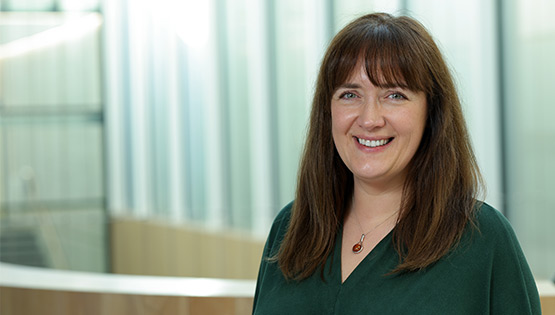Masters
2 years
Online - Part-time
90 ECTS
September 2026
About
The MSc in Applied Positive Psychology (MAPP) Well-being and Health at RCSI’s Centre for Positive Health Sciences is designed for professionals across various industries such as healthcare, education, finance, retail, IT, government, professional services and others who are interested in the application of positive psychology.
This transformative, fully online Level 9 programme offers a deep, research-led exploration of advanced topics such as systems-based well-being, the challenges of applying positive psychology in practice, and real-world healthcare applications.
With flexible learning, live tutorials, and practical assignments, MAPPWH equips professionals to enhance resilience, improve patient care, and lead meaningful change across clinical, organisational, and research settings.
This course is a Level 9 award on the Irish National Framework of Qualifications.
Apply positive psychology to real healthcare settings
Boost personal resilience and emotional well-being
Learn evidence-based strategies for human flourishing
Address trauma and adversity through positive frameworks
Promote systemic change in teams and organisations
Advance your career with a specialised Level 9 degree
Suitable for
This programme is suitable for professionals such as coaches, teachers, lecturers, workplace, well-being champions, policymakers, and many others. Within healthcare, it is suitable for doctors, nurses, surgeons, allied health staff and administrators seeking to apply positive psychology to enhance patient care, professional practice and personal well-being.
What you will learn
Discover the evolution, key ideas and real-world impact of positive psychology today.
Explore what drives well-being and flourishing, from personal to global perspectives.
Learn to apply positive psychology tools to boost well-being in real life and professional settings.
Explore how culture, context and complexity shape global approaches to well-being and strengths.
Explore how adversity, trauma and shadow experiences can deepen well-being and personal growth.
Discover how well-being influences and is influenced by the brain, body, and biological systems.
Gain the skills to design, apply, and evaluate research for evidence-informed innovation and change.
Design and deliver a real-world research project to drive innovation and evidence-informed change.
Faculty highlight
Register your interest
For further information about this course, please register your interest below.
Course information
- Apply core theories and principles of positive psychology in healthcare contexts.
- Evaluate and integrate scientific evidence to enhance personal and professional well-being.
- Design and implement interventions to promote flourishing in individuals and organisations.
- Critically assess the role of adversity, trauma, and resilience in human development.
- Explore systemic influences on well-being at individual, team, and community levels.
- Conduct applied research to address real-world healthcare challenges using positive psychology.
- Progress to doctoral-level research (e.g., PhD or Prof Doc in Psychology, Health Sciences, or Education).
- Advance careers in healthcare leadership, education, coaching, or organisational development.
- Apply their learning to specialist roles in well-being, staff development, or patient care innovation.
- Contribute to policy-making or research in health promotion and mental health.
The programme offers a diverse range of assessment formats designed to accommodate both practitioners and those pursuing academic pathways. These include written assignments, such as reflective essays, research-informed popular articles, and critical portfolios, alongside more applied tasks like video blogs, podcasts, online discussions, and group presentations.
Students engage in case studies, and real-world artefact development, with options to produce published articles, workplace interventions, or practitioner resources. This variety ensures the development of knowledge, skills, and competence across theoretical, applied, and reflective dimensions of positive psychology.
This programme is accredited by the National University of Ireland and RCSI University of Medicine and Health Sciences.
Admissions
An undergraduate degree at Level 8 on the Irish National Framework of Qualifications is usually required. If you do not hold an undergraduate degree, please see the Recognition of Prior Learning section.
English language requirements for Postgraduate programmes are published here.
If you do not meet the minimum academic requirements above, you may still be eligible to apply through recognition of prior learning (RPL). RPL is the assessment of knowledge, skills and competence previously acquired.
Learning occurs in many contexts which include work, involvement in social and community activities, or learning through life experience generally. RPL does not give credit for experience as such; rather it considers the learning that was acquired as a result of the experience.
RPL may be used to gain:
Admission to courses/programmes where a person may not have obtained the standard entry requirements.
Exemptions from course modules which duplicate the learning outcomes an individual has already demonstrably acquired through prior learning.
The recognition of prior learning (RPL) pathway is outlined here.
If you wish to apply for recognition of prior learning, please complete the essay requirement as per assignment descriptor outlined in the document below.
Exemptions may apply for:
- Applicants who have completed their school or undergraduate studies (three or more years) through English in a country where English is the majority native language.
- Applicants who have completed their school or undergraduate studies (three or more years) in an English speaking institution in a country where English is not the majority native language and where an IELTS score of 5 or more was a requirement for admissions to the programme.
- Applicants who have been working in a country (three years or more) where English is the majority native language or for an employer where English language is the official language.
- Graduates of an RCSI undergraduate, masters or professional diploma programme in Dublin and Bahrain.
Please note: certified proof must be uploaded as part of your application.
EU Fees: €12,800
Non-EU fees: €25,600
| Year 1 | Date | EU | Non-EU |
|---|---|---|---|
| Deposit
|
On acceptance of offer
|
€2,500
|
€5,000
|
| 2nd payment
|
1 November 2026
|
€3,000
|
€6,000
|
|
3rd payment |
1 March 2027
|
€3,000
|
€6,000
|
| Year 2 | |||
| 1st payment | 1 September 2027 | €2,150 | €4,300 |
| 2nd payment | 1 March 2028 | €2,150 | €4,300 |
Please note
- The fee includes all resources, access to our award-winning online learning portal and access to extensive RCSI-only databases.
- The fee includes NUI fee.
- The fee is payable via the above schedule, where relevant.
- If you have outstanding fees you will not be entitled to receive your grades or be eligible to progress and or graduate (VLE and Library privileges will be withdrawn in these cases).
- RCSI accepts no obligation to refund any fee, or part thereof, in respect of a student who chooses to withdraw from a programme.
- If you choose to withdraw from a programme you are liable for full fees owed for the seat on that programme.
- All NUI parchments are issued in Latin; you will be required to pay an additional fee of €50 to NUI if you wish to have a parchment published in English.
- Fees are subject to review annually.
- If you are being sponsored or funded by your employer you should upload a funding confirmation letter in the document upload section on the application portal. A template is available below to download at your convenience.
For more information please visit our Postgraduate fees policy.
How to apply
Applications for the MSc in Applied Positive Psychology (MAPP) Well-being and Health are now open for the autumn 2026 intake. There is only one intake each year, starting in September.
Please begin your application below.
Apply now


